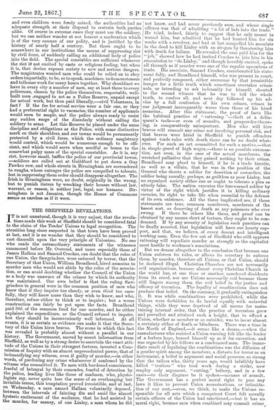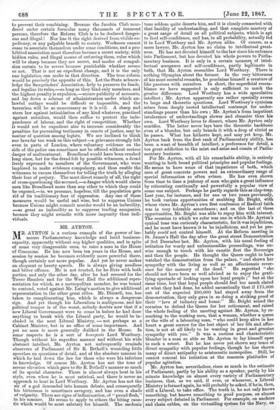lab SHEFFIELD REVELATIONS.
IT is not unnatural, though it is very unjust, that the revela- tions made this week at Sheffield should be considered fatal to the claim of the Trades' Unions to legal recognition. The atrocities long since suspected in that town have been proved at last, and it is no wonder that they should be considered to cast discredit upon the very principle of Unionism. No one who reads the extraordinary statements of the witnesses summoned before Mr. Overend, and more especially those of James Hallam and Samuel Crookes, can doubt that the rules of one Union, the Sawgrinders, were enforced by terror, that the Secretary of that Union, William Broadhead, hired assassins to murder men who would not abide by the rules of the associa- tion, or can avoid doubting whether the Council of the Union as a body was unaware of the crimes by which its authority was maintained. Our own belief is that the ruling Saw- grinders in general were in the common position of men who know that if they inquire too closely, or even think too care- fully, they will know more than they wish to know, and who, therefore, refuse either to think or to inquire ; but a worse construction can fairly be put upon the facts. Broadhead paid 301. of the common fund for one murder, and he either explained the expenditure, or the Council refused to inquire, lest they should be inconveniently well informed. At all events, it is as certain as evidence can make it that the Secre- tary of this Union hires bravos. The scene in which this fact was revealed is probably almost without a parallel in our history. The Government, moved by secret information from Sheffield, as well as by a strong desire to ascertain the exact atti- tude of the Unions in their strongest fortress, invested a Com- mission of Inquiry with an almost unprecedented power, that of
indemnifying any witness, even if guilty of murder,—in other words, of pardoning any crime whatsoever if confessed by the witness who committed it. To men with burdened consciences, fearful of betrayal by their comrades, fearful of detection by the police, leading lives like those of madmen, who, physio- logists say, never quite lose the sense of an overhanging but invisible terror, this temptation proved irresistible, and at last, on Wednesday, a man named Hallam voluntarily deposed, between the intervals of fainting fits and amid the almost hysteric excitement of the audience, that he had assisted in the murder, for money, of one Linley, a man whom he did
not know, and had never previously seen, and whose single offence was that of admitting "a lot of lads into the trade." He tried, indeed, faintly to suggest that he only meant to wound him, but admitted that he had hunted him for six weeks with a revolver, and had at last compelled his associate in the deed to kill Linley with an air-gun by threatening him with death for failure. He revealed the sum paid him for the "job," showed how he had invited Crookes to join him in his commission to "do Linley," and though horribly excited, spoke all through as if murder were one of the regular operations of trade. His associate, Samuel Crookes, corroborated his state- ment fully, and Broadhead himself, who was present in court, and perfectly composed, either overcome by that irresistible hunger for a little truth which sometimes overtakes crimi- nals, ror intending to ask indemnity for himself, shouted to the second witness that he was to tell the whole truth, to confess all, and next day followed up his ad- vice by a full confession of his own crimes, crimes in our judgment incomparably worse than those of his hired assassins.. After this statement, the proof of facts like the habitual practice of " rattening "—theft of a delin- quent's tools—or even of assaults, and gunpowder-throw- ing, is comparatively unimportant. Men who will hire bravos will commit any crime not involving personal risk, and that bravos were hired in Sheffield to punish offenders against trade rules with death there can be no doubt what- ever. For such an act committed for such a motive,—that is, simple greed of high wages,—there is no possible extenua- tion, not even, in the case of the actual murderers, the wretched palliative that they gained nothing by their crime. Broadhead may plead to himself, if he is a trade fanatic, as well as a villain, that he was in the position of the General who shoots a soldier for desertion or cowardice, the soldier being morally, perhaps, as guiltless as poor Linley, but no organized society either can or ought to tolerate a plea so utterly false. The nation executes the forewarned soldier by virtue of the right which justifies it in killing ordinary enemies, its right to take life when essential to the defence of its own existence. All the three implicated are, if these statements are true, common murderers, murderers of the basest sort, as deserving of death as any poisoners who ever swung. If there be others like them, and proof can be obtained by any means short of torture, they ought to be con- demned. If by any severity of legislation such practices can be finally arrested, that legislation will have our hearty sup- port, and that, we believe, of every decent and intelligent working man. Even the few out of Sheffield who still approve rattening will repudiate murder as strongly as the capitalist most hostile to workmen's associations.
But we demur altogether to the conclusion that because one Union enforces its rules, or allows its secretary to enforce them, by murder, therefore all Unions, or that Union, should be declared illegal. Christian Churches are not necessarily evil organizations, because almost every Christian Church in the world has, at one time or another, murdered dissidents from its creed, nor are Unions necessarily evil because there still lingers among them the evil belief in the justice and efficacy of terrorism. The legality of combinations does not produce that belief. On the contrary, it gradually extinguishes it. It was while combinations were prohibited, while the Unions were forbidden to do lawful equally with unlawfnl things, while they were deprived of all means for main- taining internal order, that the practice of terrorism grew and prevailed and attained such a height, that to offend a Union, whether as member or as outsider, was to incur almost a certainty either of death or blindness. There was a time in the North of England,—it seems like a dream,—when the manufacturer who resisted a Union warning felt like the leader of a forlorn hope, braced himself up as if for execution, and was regarded by his fellows as a condemned man. The imme- diate result of legalizing the combinations was the diffusion of a gentler spirit among the members, a distaste for terror as an instrument, a belief in argument and social pressure. so strong that the tailors who, thirty years ago, would infallibly have killed " traitors " who took work during a strike, now employ only argument, "cutting," bribery, and in a few cases—to their disgrace be it spoken—menace of assault. The Government has a perfect moral right to pass any laws it likes to prevent Union assassinations, or intimida- tion of any sort,—even, we think, to make the Unions re- sponsible for all acts which a competent Court felt morally certain officers of the Union had sanctioned,—but it has no moral right, because men when combined may commit crime, to prevent their combining. Because the Jacobin Club mur- dered under certain formulas many thousands of innocent persons, therefore the Reform Club is to be declared danger- ous and illegal I Nor has it the right derived from visible ex-: pediency, or any palpable benefit to society. Workmen cannot cease to associate themselves under some conditions, and a pro- hibited association must therefore become a secret society, with hidden rules, and illegal means of enforcing them, rules which will be sharp because they are secret, and modes of compul- sion certain to be severe because punishable whether severe or not. That is not an expedient change, and it is the only one legislation can make in that direction. The true reform would be precisely the opposite of this. Let the State acknow- ledge the Sawgrinders' Association, help to preserve its funds, and legalize its rules,—so long as they bind only members, and the highest penalty is expulsion,—secure publicity of accounts, and lay down a scheme of administration under which un- lawful outlays would be difficult or impossible, and the terrorism will be as unnecessary as it is evil. A sharp and stern law against intimidation of any kind whatever, practised against outsiders, would then suffice to protect the inde- pendence of labour, and the right of competition. Whether it would not be expedient also to increase considerably the penalties for preventing testimony in courts of justice, may be matter of question among legists. We are inclined to think our laws far too weak on this subject —a grievance strongly felt even in parts of London, where voluntary evidence on the side of the police can sometimes not be offered without serious danger of maltreatment. Broadhead would have been crushed long since, but for the dread felt by possible witnesses, a dread freely expressed to members of the Government, who were implored to make evidence compulsory, and thus enable the witnesses to excuse themselves for telling the truth by alleging their fear of perjury. The most direct remedy of all, the right of cross-questioning the accused,—a danger which would alarm men like Broadhead more than any other to which they could be exposed,—is, we presume, hopeless, till the population gets rid of its traditionary fear of oppression. Any one of these measures would be useful and wise, but to suppress Unions because Unions might commit murder would be an imbecility, —as great an imbecility as to suppress trading companies, because they might swindle with more impunity than indi- viduals.































 Previous page
Previous page